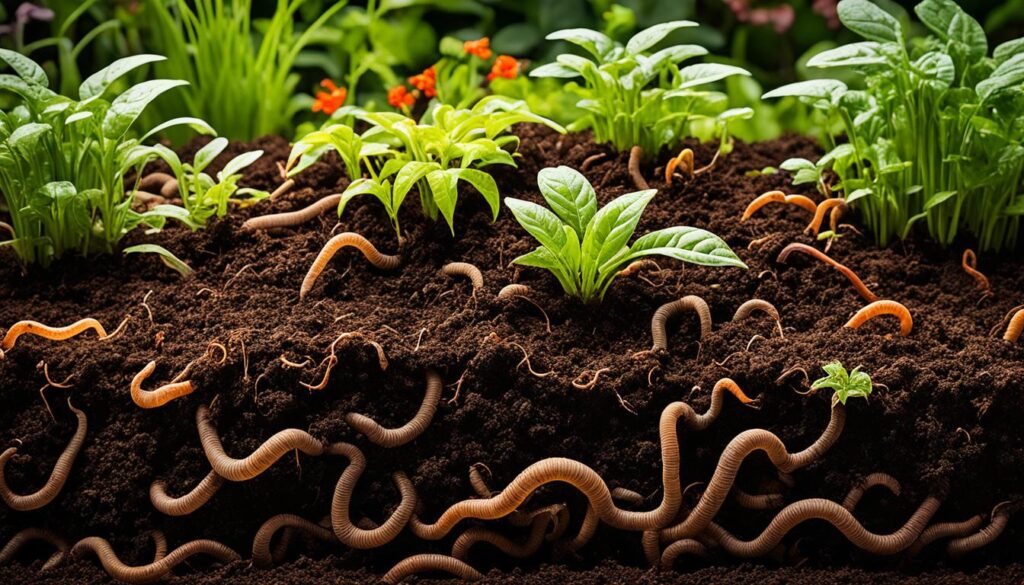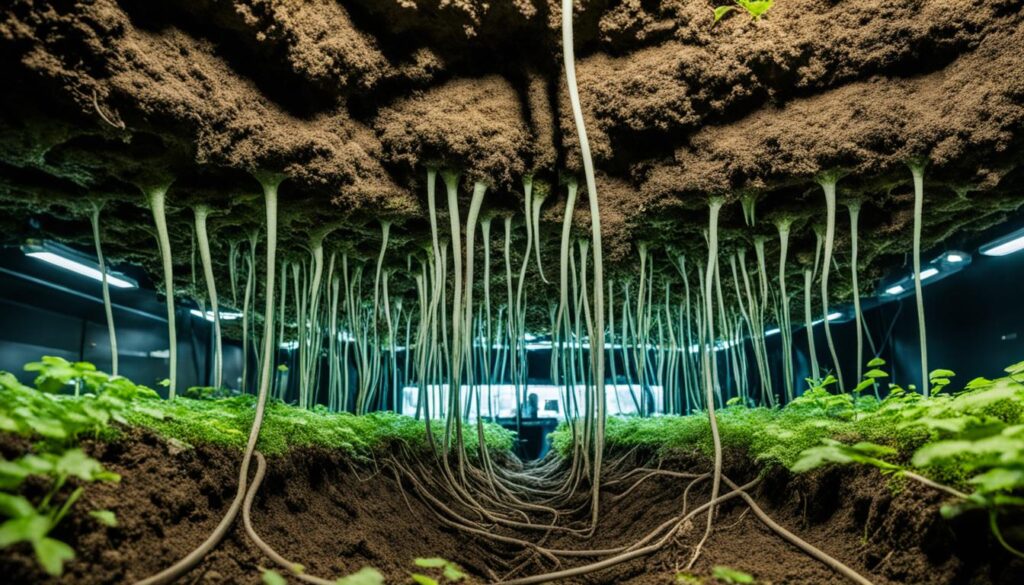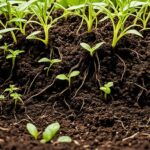Understanding Soil Health: The Foundation of Sustainable Gardening
Do you know the secret to vibrant, thriving plants? It’s right beneath your feet – in the soil! Soil health is key to sustainable gardening, but many gardeners forget this important part. Imagine a garden full of life where plants grow well without harsh chemicals. This is possible with healthy soil.
Your soil is alive, full of tiny creatures and insects that help plants grow. By taking care of this underground world, you can make a garden that’s beautiful, kind to the planet, and sustainable.
Key Takeaways
- Soil health is the foundation for sustainable gardening, supporting plant growth and ecosystem balance.
- A diverse soil biome, including beneficial microbes and organisms, contributes to nutrient cycling, organic matter decomposition, and carbon sequestration.
- Proper soil structure and moisture retention are crucial for healthy plant roots and resilience against environmental stresses.
- Sustainable soil management practices, such as composting and cover cropping, can improve soil fertility and reduce the need for chemical inputs.
- Soil testing and targeted amendments can help address specific nutrient deficiencies and balance the soil’s pH for optimal plant performance.
The Living Soil: A Microbial Wonderland
Underneath your feet, the soil is full of soil microbes like beneficial bacteria, fungi, protozoa, and nematodes. These tiny creatures are key to a healthy garden. They help break down organic matter, release nutrients, and keep plants safe from diseases.
Beneficial Bacteria and Fungi
Beneficial soil bacteria work hard to turn complex organic materials into nutrients for your plants. Soil fungi create networks that carry nutrients to your plants’ roots. These tiny helpers make sure your garden gets the nutrients it needs to grow strong.
Protozoa and Nematodes
Soil protozoa and soil nematodes are also crucial. They eat harmful bacteria and fungi, keeping the soil balanced. This balance is key to your plants getting the right nutrients and staying healthy.
By taking care of the beneficial soil bacteria, soil fungi, soil protozoa, and soil nematodes, you help your garden grow. You’ll get more healthy plants and a garden that takes care of itself.
“The soil is the great connector of lives, the source and destination of all.” – Wendell Berry
Nutrient-Rich Soil: The Key to Healthy Plants
Sustainable gardening means feeding your plants naturally, not with synthetic fertilizers. The key is to create soil rich in nutrients for strong plant growth. Soil’s living things break down things like compost and plant leftovers, giving your plants the nutrients they need.
Natural Nutrient Cycling
This process of nutrient cycling gives your plants what they need and keeps nutrients balanced. It’s better than synthetic fertilizers, which can cause problems. This way, your garden grows healthy and eco-friendly.
Balanced and Sustainable Nutrient Supply
By building soil nutrients, using organic matter, and encouraging nutrient cycling, you make a sustainable soil system. This supports plant nutrition and makes your garden lush and healthy. It also helps your garden stay strong over time.
“The key to a successful, sustainable garden lies in the health of your soil. By nurturing the natural nutrient cycles, you’ll unlock the true potential of your plants.”
Soil Structure and Water Retention
In sustainable gardening, the way your soil is structured is key. It affects aeration, drainage, and how well it holds water. These are crucial for your plants’ health and strength.
Adding organic matter like compost or manure helps improve soil structure. These materials help create a crumbly, porous soil. This makes air and water move better through the soil, helping roots grow and plants use water well.
Organic soils are great at keeping water in, which is vital in dry areas or where rain is unpredictable. They make plants more drought resilient. This means they can survive with less water and do well in tough conditions.
| Soil Property | Importance | Benefit |
|---|---|---|
| Soil Structure | Influences aeration, drainage, and water retention | Promotes plant health and resilience |
| Organic Matter | Improves soil aggregation and porosity | Enhances water movement and drought tolerance |
| Soil Porosity | Allows for better air and water circulation | Supports root growth and plant health |
By focusing on your soil’s structure and how it holds water, you can make your garden thrive. This approach helps your garden deal with climate changes and unpredictable weather. Taking care of your soil is key to a successful and lasting garden.
Biodiversity and soil health
In organic gardening, having a variety of life forms is key. This includes everything from tiny microbes under the soil to different plants above. A balanced ecosystem is vital for keeping your garden healthy.
Mycorrhizal Associations
The heart of this balance is the partnership between plant roots and mycorrhizal fungi. These fungi help plants reach more nutrients in the soil. In return, plants give them sugars from photosynthesis. This relationship makes plants healthier and more resistant to problems.
Companion Planting and Ecosystem Balance
Having different plants in your garden is also important for balance. By using various crops and cover plants, you can fight pests and diseases naturally. This way, you use helpful insects and microbes to keep your garden healthy without chemicals.
By focusing on soil biodiversity, you can create a garden that’s full of life. It will give you lots of food and help the environment. Discover how the living soil works, and see your garden grow with nature’s help.
Pest and Disease Management Naturally
Organic gardening focuses on preventing pests and diseases with natural methods. It starts with healthy soil, which helps plants stay strong. Healthy soil has many microorganisms that fight diseases and make plants stronger against pests.
Disease Suppression through Diverse Microbes
Beneficial microbes in the soil work together to stop plant diseases. They compete with harmful organisms for resources and produce antibiotics. By using organic gardening, you can use nature’s own ways to fight diseases.
Resilient Plants through Proper Nutrition
Plants that get the right nutrients are stronger against pests and diseases. They grow stronger cell walls and have better immune systems. They also make more compounds that keep pests away. Using companion planting helps plants work together to stay healthy.
| Organic Gardening Practice | Benefit for Pest and Disease Management |
|---|---|
| Diverse Soil Microbiome | Suppresses plant diseases through competition, antibiotic production, and direct parasitism of pathogens |
| Balanced Nutrient Supply | Strengthens plant immunity and production of natural pest-deterring compounds |
| Companion Planting | Enhances plant resilience through mutually beneficial relationships between different crops |
Organic gardeners use natural methods to manage pests and diseases. They focus on the soil’s living diversity and give plants the right nutrients. This approach creates a healthy, sustainable garden.
The Role of Organic Matter
Organic matter is key to a healthy garden. Adding different organic materials to your soil brings many benefits. These help plants grow better and make your garden more sustainable.
Composting and Cover Crops
Composting changes kitchen scraps and yard waste into a soil booster. It helps reduce waste and gives your garden a valuable resource. Cover crops like legumes and clover help during off-growth seasons. They stop soil erosion, fight weeds, and add organic matter when plowed under.
Mulching for Moisture Retention
Using mulch, such as straw or wood chips, on your garden beds is very helpful. It keeps the soil moist, stops weeds, and keeps the soil temperature right. This is great for the tiny helpers that make plants grow and cycle nutrients.

“The health of soil, plant, animal and man is one and indivisible.” – Lady Eve Balfour
Using organic matter makes your garden strong and healthy. Practices like composting, cover cropping, and mulching work together. They build a strong soil base for sustainable gardening for many years.
Soil Testing and Amendments
Healthy soil is key to sustainable gardening. Soil testing helps you understand your soil’s makeup. This lets you choose the right soil amendments to boost fertility and pH levels. This supports the growth of healthy, strong plants.
Home soil testing kits give you insights into nutrient levels, organic matter, and pH balance. With this info, you can fix any issues. This ensures your plants get the nutrients they need to grow well.
Adjusting Soil pH
Soil pH affects nutrient availability. If your soil is too acidic or alkaline, you might need to adjust it. Using lime or sulfur can help. These amendments change the pH to create a better environment for plants.
Balancing Nutrient Levels
Soil tests show nutrient levels like nitrogen, phosphorus, and potassium. Knowing these levels lets you add amendments like compost or manure. This ensures your plants get the nutrients they need.
Adding organic matter, like compost or cover crops, improves soil structure and health. This supports sustainable gardening in the long run.
| Soil Amendment | Purpose | Recommended Application Rate |
|---|---|---|
| Limestone | Increase soil pH | 2-4 lbs per 100 sq ft |
| Sulfur | Decrease soil pH | 1-2 lbs per 100 sq ft |
| Compost | Improve soil structure and nutrient levels | 2-4 inches worked into the top 6-8 inches of soil |
| Balanced Organic Fertilizer | Provide a comprehensive nutrient boost | Follow product instructions for application rates |
Regular soil testing and targeted amendments create a nutrient-rich environment. This supports your plants’ health and vitality. It ensures a bountiful harvest year after year.
“The key to a successful garden is in the soil. By understanding and nurturing the foundation of your growing space, you unlock the true potential of your plants.”
Carbon Sequestration and Climate Change Mitigation
As an organic gardener, you have a big role in fighting climate change. The health of your soil is key in carbon sequestration and climate change mitigation.
Organic gardening helps pull carbon dioxide from the air and store it in the soil. The organic matter you add acts as a carbon sink. This is crucial for fighting climate change.
- Organic gardening builds up organic matter in the soil, which stores carbon.
- Healthy soils can hold a lot of atmospheric carbon, lowering greenhouse gas levels.
- By using sustainable gardening methods, you help fight climate change and show environmental responsibility.
| Sustainable Gardening Practice | Carbon Sequestration Benefits |
|---|---|
| Composting | Adds organic matter to the soil, increasing its carbon-holding capacity. |
| Cover Cropping | Promotes the growth of plant roots, which help store carbon in the soil. |
| Mulching | Retains soil moisture and prevents the release of stored carbon into the atmosphere. |
Organic gardening helps make our planet sustainable and fights climate change. Your garden can be a carbon sink, tackling global environmental issues.
“Soil is the foundation of life, and it is our responsibility to protect and nurture it. Through organic gardening, we can create a healthier, more resilient planet for future generations.”

Soil Health: The Foundation of Sustainable Gardening
Soil health is key to sustainable gardening. It’s vital for growing plants that are healthy and in harmony with nature. By focusing on soil health, gardeners can grow more food and protect the environment.
Organic gardening means working with nature, not against it. It avoids synthetic fertilizers and pesticides. Instead, it builds a living ecosystem in the soil. This way, plants get the nutrients they need and supports many living things, making gardens healthy and full of life.
Understanding the life under our feet is crucial for organic gardening. Soil is full of tiny helpers like bacteria and fungi that are key for plant health. By taking care of these tiny helpers, gardeners can make their gardens strong and self-sufficient.
“Soil health is the foundation of sustainable gardening. By focusing on building and maintaining nutrient-rich, biologically diverse, and structurally sound soil, organic gardeners can create thriving gardens that are resilient, sustainable, and in tune with the natural world.”
Practices like cover cropping and composting help improve soil. They make it better at holding water and giving plants what they need. These methods help plants grow strong and support the environment by fighting climate change.
Soil health is the core of sustainable gardening. By taking care of the soil, gardeners grow healthy plants and protect nature. This way, they can enjoy a garden that’s full of life and good for the planet.
Conclusion
Your journey to sustainable gardening starts with soil health. By understanding life beneath the surface, you can make your garden thrive. It will give you lots of harvests and help the environment.
Using organic gardening methods like compost and natural pest control helps. These practices feed soil microbes and improve nutrient cycling.
As a gardener, you play a big role in fighting climate change by storing carbon in the soil. Your focus on soil health helps your plants and protects our ecosystem. By following organic gardening, you become a guardian of the earth, keeping your garden and the planet healthy for the future.
Soil health is key to your sustainable gardening journey. By making your soil rich and diverse, you unlock your garden’s full potential. You’ll get healthy plants and lots of food while helping the environment.
FAQ
What is the importance of soil health in gardening?
How do soil microorganisms contribute to soil health?
How does organic gardening nourish plants naturally?
Why is soil structure important in organic gardening?
How does organic gardening encourage biodiversity?
How can organic gardening practices help manage pests and diseases naturally?
Why is the incorporation of organic matter essential in organic gardening?
How can soil testing benefit organic gardeners?
How does organic gardening contribute to climate change mitigation?
Source Links
- https://mountviewservices.com/understanding-soil-health-a-key-to-sustainable-landscaping/ – Understanding Soil Health – A Key to Sustainable Landscaping
- https://alluvialsoillab.com/blogs/news/the-crucial-role-of-soil-in-organic-gardening-nurturing-a-sustainable-harvest-enhancing-soil-health-through-testing – The Crucial Role of Soil in Organic Gardening: Nurturing a Sustainable Harvest, Enhancing Soil Health Through Testing | Alluvial Soil Lab
- https://extension.oregonstate.edu/catalog/pub/em-9409-understanding-soil-health-biota-farms-gardens – Understanding Soil Health and Biota for Farm and Garden
- 10 Must-Have Blooms for Your 2025 Garden
- The Health Advantages of Gardening You Need to Know
- How to Create a Small Vegetable Garden Layout Plan: A Beginner’s Guide
- DIY Garden Projects for Small Spaces: Upcycling Ideas to Maximize Your Garden
- Watering Techniques for Small Gardens: Ensuring Your Plants Thrive
- Small Border Plants for Landscaping: Adding Beauty and Functionality to Your Garden
- Year-Round Small Space Gardening: Seasonal Planting Tips for Maximum Harvest
- Essential Tools for Small-Space Gardening: What You Really Need
- The Ultimate Guide to Container Vegetables: What to Grow in Small Spaces
- Budget-Friendly Gardening: How to Create a Thriving Garden on a Tight Budget
- How to Optimize Sunlight in Small Gardens: Tips for Better Plant Growth
- DIY Vertical Planters: Creative Ideas for Small Space Gardening
- Companion Planting for Small Vegetable Gardens: Boost Growth and Deter Pests
- Container Gardening Essentials: Choosing the Right Pots, Soil, and Plants
- Vertical Gardening Techniques: Maximizing Your Small Space with Climbers and Vines
- How to Build a Raised Bed Garden in a Small Backyard: Step-by-Step Guide
- The Best Vegetables for Small-Space Gardens: High-Yield Varieties You Need to Grow
- Smart Vegetable Garden Layouts for Small Spaces: Maximizing Your Green Thumb in Compact Areas
- 40. Best Practices for Managing a Sustainable Garden Year-Round
- Building a Wildlife Pond for Biodiversity
- Advanced Techniques in Sustainable Gardening
- How to Create a No-Till Garden
- The Mental Health Benefits of Gardening
- Using Technology to Enhance Sustainable Gardening
- Getting Certified Organic: Steps and Benefits

Leave a Reply